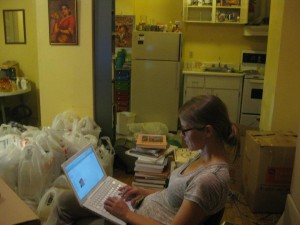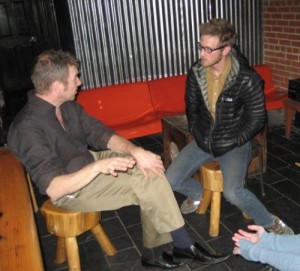 I awoke after last night’s party to an apartment quite, uh, messy. You can predict what I saw: a lot of empty bottles, unfinished drinks, food scraps on plates and on the floor, a guest’s forgotten scarf, etc. The kitchen counter was particularly intense in its clutter, and it took a moment of gathering psychological fortitude to dive into cleaning up.
I awoke after last night’s party to an apartment quite, uh, messy. You can predict what I saw: a lot of empty bottles, unfinished drinks, food scraps on plates and on the floor, a guest’s forgotten scarf, etc. The kitchen counter was particularly intense in its clutter, and it took a moment of gathering psychological fortitude to dive into cleaning up.
What struck me as the difficulty in cleaning this stuff up (and something similarly is true of packing up the house when moving) was the disorganized character of the mess. In contrast to an assembly line, where each task is systematically separated from others and carried out quickly and  repeatedly, allowing production to move forward at a very fast rate, the items that make up the mess each demand to be treated singly–basically, you can’t build up any momentum.
repeatedly, allowing production to move forward at a very fast rate, the items that make up the mess each demand to be treated singly–basically, you can’t build up any momentum.
This situation was especially emblematized to me by the crumpled up bags on the counter (bags that had formerly contained potato chips, wine bottles, etc.). When partyers had extracted their comestibles from the bags, they had scrunched the bags up with their hands (possibly a practice and a gesture that they found satisfying in itself, as people sometimes enjoy crushing their empty beer cans). The reason I noticed the bags was that, in gathering up the paper ones for recycling, I noticed how much less space they took up when I folded them up neatly, compared to how much space they occupied in their crumpled state.
Uncrumpling the bags and folding them neatly was actually a moderately pleasing activity, different in gesture but probably roughly equivalent in level of emotional payoff to that experienced by the original crumplers. I also noticed how much easier it would have been to fold the bags neatly in the first place (i.e., pre-scrunching) than it was to do it now, having to force a compact fold onto a bag after first uncrumpling it.
No doubt there are plenty of circumstances in which a crumpling attitude is better than a folding attitude. Last night was a party, after all, so self-controlled orderliness is probably less fitting to that event that messy spontaneity. Some other situations are not like this, though.
 When situations are challenging and stressful, we feel a sense of pressure, and we want that pressure to be released and the situation to be over. Under pressure, we often “lose our cool” and act rashly. We do something spontaneous and messy, giving the pleasurable feeling of agency–“I did something”–and of release from the visegrips. Such rash actions, however, generally fit quite poorly with high pressure situations. The pressure is typically there because the situation is important and because the issues are complex. What such situations typically call for is precisely the opposite of messy spontaneity: they call for self-controlled orderliness.
When situations are challenging and stressful, we feel a sense of pressure, and we want that pressure to be released and the situation to be over. Under pressure, we often “lose our cool” and act rashly. We do something spontaneous and messy, giving the pleasurable feeling of agency–“I did something”–and of release from the visegrips. Such rash actions, however, generally fit quite poorly with high pressure situations. The pressure is typically there because the situation is important and because the issues are complex. What such situations typically call for is precisely the opposite of messy spontaneity: they call for self-controlled orderliness.
Interpersonal conflict, always an arena of highly charged emotions, is a prime site for this mismatch of call and response. Our conflict calls for the careful, cooperative sorting through of some issue–quite possibly, a matter of uncrumpling something we already scrunched up–but our responses can often be hasty, grumpy gestures in which, even if it wasn’t a crumpled mess already, our communication is soon made into one. What we get left with then, in addition to the original problem that needed sorting out, is something that first needs to be uncrumpled before it can be folded up properly. And, like the paper bag, it never folds as well after having been crumpled as it would have when it was still a fresh surface.


 Participants in these
seminars consistently have the experience of growth in their conversation and
conceptual abilities, and typically leave with a transformed sense of the nature
and possibilities of philosophy.
Participants in these
seminars consistently have the experience of growth in their conversation and
conceptual abilities, and typically leave with a transformed sense of the nature
and possibilities of philosophy.





One Comment
I like the image of a crumpled bag taking up much more space than a folded one. How quickly those bags can take over one’s lived space, and start to crumple one’s other abilities.
From a mom of a three-year old crumpler (is “crumpler” redundant here?) who is also a crumpler in rehab.